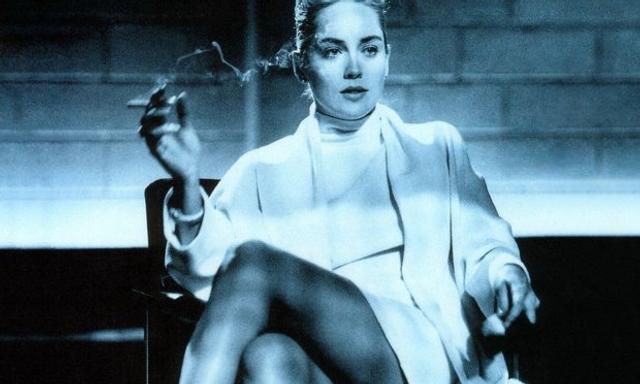Basic Instinct is often remembered in a variety of ways - the infamous leg-crossing scene, Jerry Goldsmith's noirish score, that ridiculous nightclub scene, the often laughable dialogue - but almost all of the praise heaped on the film is very often done in an ironic manner.
It's true, Basic Instinct received mixed reviews on its arrival in cinemas twenty-five years ago and even featured in a comedy routine by Bill Hicks and, yes, the film hasn't aged particularly well - but what noir thriller ever does? Let's take Chinatown; a brilliantly directed LA noir that's firmly rooted in its period detail. Arguably Roman Polanski's finest work, Chinatown is very much a product of its environment and it encourages you to go into that world. Lawrence Kasdan's Body Heat, more closer to Basic Instinct in its tone and 'erotic' leanings, is also very much defined by the era in which it was set - early '80s America. Basic Instinct is the same; very much of the '90s and about the '90s.
The film opens with a gruesome murder of a retired rock star who, as it turns out, is now a respected member of the community. There's cocaine, he's tied up and he was most likely murdered mid-coitus. It's a scandal waiting to happen and now it's up to Michael Douglas' character, himself just fresh out of controversy, to investigate. The idea of those in the community or those in high institutions being caught in compromising situations wasn't anything new, but it was clear that the hunger for salacious gossip was beginning to take root in American society. The OJ Simpson murder trial and the Clinton-Lewinsky affair were just three years after Basic Instinct's release, all featuring highly recognisable people in dangerous and shameful scenarios.
Screenwriter Joe Eszterhas' previous efforts in the noir genre was 1985's Jagged Edge. It featured Jeff Bridges as the husband of a murdered San Francisco socialite who begins a relationship with his lawyer, played by Glenn Close. Although it received much more positive reviews than Basic Instinct initially, it was far less commercially successful - and much more reserved in how it handled both sex and murder on screen. Paul Verhoeven's stated intention when signing on to direct Basic Instinct was that he wanted to make the first mainstream Hollywood film with an erect penis in it. He didn't get his wish, but nevertheless, Verhoeven was determined to make a film that was sensational, scandalous and riven with the kind of pulp and salaciousness with which he was known for in his native Holland.
This followed the film from the very beginning. Verhoeven said that he shot one of the many sex scenes between Douglas and Stone for five days, using a variety of lenses and angles so that when the MPAA would force the scene to be recut, he'd have enough footage to work with. Sharon Stone later referred to herself and Douglas as "the horizontal Fred Astaire and Ginger Rogers of the '90s," owing to the choreographed and lengthy nature of the scene. Stone later claimed that Verhoeven shot the leg-crossing scene without her knowledge, although Verhoeven denies this. The film was initially given an NC-17 rating, however Verhoeven had to make a total of 14 different cuts to the film - at TriStar's behest - before it was given an R rating.
However, the scandals weren't even close to dying down for Basic Instinct. The screenplay itself leaked to press during production, with members of the LGBT community taking exception to how it portrayed bisexual women as murderers. Later, gay rights activists publicly demonstrated against the film during production and on the film's release, with Verhoeven reportedly issuing fake call-sheets so that protesters would block unused locations. When the film went on release, cinemas were picketed and flyers were handed out which revealed the film's twist ending. Yet, in spite of the negative reviews, the protests during production and the film's theatrical release, it became a commercial smash - earning $352.9 million against a $49 million production budget.
Although Basic Instinct wasn't the first of its kind to blend scandal, sex and murder together on screen, it was undoubtedly its zenith. Although films like Disclosure - which, funnily enough, also starred Michael Douglas - might have dabbled in this kind of pulpy sensationalism, Basic Instinct was rooted in it and made no qualms about what it was. It's hard to know if Verhoeven was embracing this, but he certainly knew what he was doing. When the screenplay leaked and was met with hostility by the gay community, Estzerhas allegedly wanted to make changes to the film so as to appease them. Verhoeven blankly refused. Douglas and Stone were both subject to criticism for their involvement; indeed Stone's career never fully recovered from it. In a 2006 interview, Douglas said that the reaction to the film "was extreme – people accusing us of misogyny and all sorts. It was difficult. When we were casting I wanted Catherine to be played by someone of equal stature as me, to share the risks. I didn’t want to go up there on my own on that one. A director can fail on that kind of picture and walk away relatively unscathed, but as an actor you can look like a total asshole."
The film has become a byword for erotic thriller, effectively defining it for a generation, but also being effectively the last of its kind. Since the film's twenty five years ago, there hasn't been any film that's even dared to come close to it in terms of star power and inciting the kind of reaction that Basic Instinct got. Whether that's down to studios being less permissive with sexual content, changes in how society views sex on screen and how it's disseminated, or even just actors not wanting to go all in the way Michael Douglas and Sharon Stone did, nobody really knows. It has taken on a second life - like Verhoeven and Estzerhas' other effort, Showgirls - as a sort of ironic masterpiece, but the film does have common DNA with the greats. Moreover, Jan DeBont's cinematography is layered and beautiful, and Jerry Goldsmith's score just adds to the atmosphere. Stone and Douglas' chemistry on screen together lights up the screen and while some of the dialogue is clunky, it's all in keeping with the Hitchcockian throwbacks.
Twenty five years on, there hasn't been a film like it.




















































































